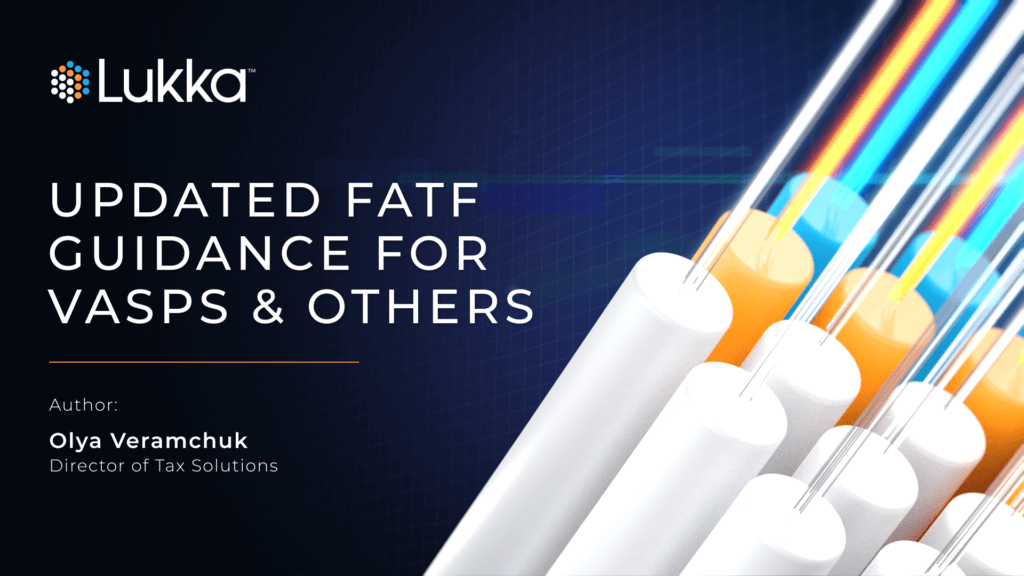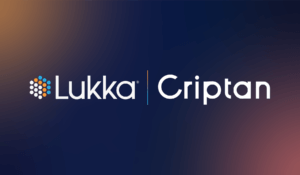Author: Olya Veramchuk, Director of Tax Solutions in Tax & Regulatory Affairs
FATF issues updated guidance for a risk-based approach for virtual assets and virtual asset service providers
The Financial Action Task Force (“FATF”), the global money laundering and terrorist financing watchdog, kicked off October 28, 2021, by issuing the updated guidance for virtual assets (“VAs”) and virtual asset service providers (“VASPs”). The earlier version of the report was issued in spring 2021 and was criticized by many industry participants for being too broad and unclear. The new iteration of the report forms part of the FATF’s ongoing monitoring of the virtual assets and VASP sector, offers long-awaited clarifications and comments on DeFi protocols, NFTs, stable coins, travel rule application, and more.
For better or worse, the document is long and FATF intends for the definitions to be applied broadly. High-level highlights of the new guidance are outlined below.
- VAs are defined as “a digital representation of value that can be digitally traded or transferred and can be used for payment or investment purposes. Virtual assets do not include digital representations of fiat currencies, securities, and other financial assets that are already covered elsewhere in the FATF Recommendations.”
Notably, non-fungible token (“NFT”) collectibles weren’t explicitly included in the definition of virtual assets. However, in the event an NFT is used for “payment, investment purposes” or as a value transfer, then it would likely fall under the VA umbrella. FATF suggests that the regulators apply a “functional equivalence and objective-based approach” when in doubt, encouraging understanding assets’ functionality and purpose.
Further, FATF lowered the threshold amount for VA-related transactions to USD/EUR 1,000 due to the money laundering risks “associated with, and cross-border nature of” virtual asset activities.
- VASPs are redefined to ”any natural or legal person that conducts one or more of the following activities or operations for or on behalf of another natural or legal person:
- Exchange between virtual assets and fiat currencies;
- Exchange between one or more forms of virtual assets;
- Transfer of virtual assets;
- Safekeeping and/or administration of virtual assets or instruments enabling control over virtual assets; and
- Participation in and provision of financial services related to an issuer’s offer and/or sale of a virtual asset.
Depending on their particular financial activities, VASPs include “VA exchanges and transfer services; some VA wallet providers, such as those that host wallets or maintain custody or control over another natural or legal person’s VAs, wallet(s), and/or private key(s); providers of financial services relating to the issuance, offer, or sale of a VA (such as in an ICO); and other possible business models”.
Interestingly, multi-signature wallets where “a person maintains unilateral control of their assets at all times” seem to not be covered by the VASP umbrella. But only as long as it doesn’t “actively facilitate” the transfer. Unfortunately, no explanation as to what “active facilitation” would mean was provided.
- No concrete clarification is provided with respect to DeFi protocols. The guidance introduces the concept of owner vs. operator and remarks that anyone with “sufficient influence” of a protocol would rise to the level of a VASP. It is unclear how one would define how much influence would rise to the level of being “sufficient” or how that should be measured.
- Stablecoin issuers with a “central developer or a governance body” which handles the basic management functions, including “development and launch of” a stablecoin, would likely be classified as financial institutions or VASPs.
- FATF is particularly concerned with the peer-to-peer transactions carried out via self-hosted and unhosted wallets, as in their view such transactions pose a heightened risk of money laundering. This is because “illicit actors can exploit the lack of an obligated intermediary in P2P transactions to obscure the proceeds of crime because there is no obliged entity carrying out the core functions of the FATF Standards.” Risks could be mitigated in the following ways:
- Conducting outreach to the private sector;
- Training of supervisory, financial intelligence unit and law enforcement personnel; and
- Encouraging the development of methodologies and tools, such as blockchain analytics, to collect and assess P2P market metrics and risk mitigation solutions, risk methodologies to identify suspicious behaviour, and determine whether wallets are hosted or unhosted, including by engaging with programmers/developers in this space.
- The travel rule requirements were expanded: VASPs are now expected to ensure disclosing and transferring certain customer data as part of each digital asset transaction, but robust due diligence with respect to the counterparty VASP is required before the information is remitted. This is because VASPs which do not implement the travel rule would be considered higher risk. Transactions should be screened on the ongoing basis to ensure that no sanctions were levied on the counterparty to the transaction. Notably, FATF clarified that the travel rule would not apply to transfers between a VASP and an unhosted wallet, thus taking the fees paid to validators and miners out of scope.
It is worth remembering that FATF guidance is not binding and does not override the views of the national authorities. However, the organization has its ways of applying pressure on non-compliant members, including blacklisting them. Undoubtedly, the next few weeks will be extremely interesting, as the guidance gets dissected and digested by global regulators and market participants alike.
The information contained in this bulletin provides only a general overview of current issues and shall in no event be construed as the rendering of professional advice or services. As such, the information provided in this bulletin should not be used as a substitute for consultation with professional advisors. Before making any decision or taking any action regarding your digital currencies or the tax treatment thereof, you should always consult with an appropriate, licensed tax, accounting, or other professional. To the fullest extent permitted by law, in no event will Lukka, Inc. (including its related entities, owners, agents, directors, officers, advisors, or employees) be liable to any reader of this bulletin or anyone else for any direct, indirect or consequential loss or loss of profit arising from the use of this bulletin, its contents, its omissions, reliance on the information contained within it, or on opinions communicated in relation thereto or otherwise arising in connection therewith.




